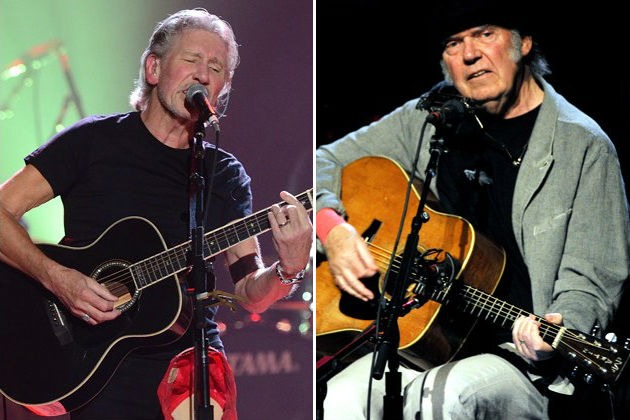Musicians often seem united when it comes to social and political issues, so the controversy around Roger Waters and his outspoken criticism of Israel is somewhat untested ground.
Last week, the Pink Floyd bass player publicly released a letter he had sent to Neil Young in which he pleaded with Young to "Please, brother, tell me it ain’t so," after hearing of Young's intent to play in Tel Aviv. Waters cited their shared boycott of South Africa during apartheid, asking that Young join him in "refusing to lend our names to the whitewashing of the illegal colonization of Palestinian land and the systematic oppression of its indigenous people.” The letter remained unanswered, and Young never cancelled the concert (Tel Aviv police cancelled it instead, due to safety concerns). Additionally, Waters and bandmate Nick Mason called for the Rolling Stones to cancel a performance in Israel, echoing the sentiments expressed to Young. Like Young, the Rolling Stones neglected this appeal, performing in Tel Aviv on June 4.
The backlash against Waters' statements is particularly strong — and informed by his past. Many say Waters is blatantly anti-Semitic, pointing to his release of a floating inflatable pig with the Star of David on it at a Belgian gig last year. A few years before, animation in his “The Wall” tour morphed Stars of David into dollar signs, leading to an uproar. In a recent New York Observer opinion piece called “The Anti-Semitic Stench of Pink Floyd,” Rabbi Shmuley Boteach addressed Waters, saying, “you have no decency, you have no heart, you have no soul,” and reminding him of the grueling hardships endured by Israelis over the years. Rabbi Boteach specifically addressed Waters' comparison of the Israeli leadership to Nazi Germany in the 1930s. Waters denies allegations of antisemitism, citing the fact that his father died fighting the Nazis.
 A number of musicians have declined to participate in the kind of boycott of Israel that Waters champions. Alicia Keys, Elton John, Lady Gaga, Red Hot Chili Peppers, Rihanna and Madonna are among many artists who have performed there in the past few years. Alicia Keys explained her decision to the New York Times, saying “I look forward to my first visit to Israel. Music is a universal language that is meant to unify audiences in peace and love, and that is the spirit of our show.”
A number of musicians have declined to participate in the kind of boycott of Israel that Waters champions. Alicia Keys, Elton John, Lady Gaga, Red Hot Chili Peppers, Rihanna and Madonna are among many artists who have performed there in the past few years. Alicia Keys explained her decision to the New York Times, saying “I look forward to my first visit to Israel. Music is a universal language that is meant to unify audiences in peace and love, and that is the spirit of our show.”
Still, other artists have come out publicly in criticism of Israel's actions vis-a-vis Palestine. Elvis Costello, the late Pete Seeger, Carlos Santana, Jon Bon Jovi, Brian Eno and the Pixies are among artists who have recently refused to perform in Israel as a result of the “BDS” movement, which stands for “Boycott, Divestment, Sanctions.”
At a gig in Britain on Friday night, Eddie Vedder of Pearl Jam launched into one of his signature monologues during the band’s performance of the song “Daughter.” Although he never specifically mentioned Israel, he asserted, “They're looking for a reason to go across borders and take over land that doesn't belong to them and they should get the f—k out, and mind their own f—king business. Everyone's the f—king same, so why are people at war? Stop the f—king s—t now!”
In response, one blogger accused him of being out of touch with history and seemingly forgetting that Israel pulled out of Gaza years go. Anger also surged from Vedder's own Israeli fans, who had staged a social media campaign to bring Pearl Jam to the country. Ben Red, an Israel Radio DJ and one of the campaign's organizers, summed up their sentiments, saying "Eddie Vedder, your true face is finally being revealed. You are invited not to come here. I personally do not want to see you, and I will erase the Facebook page calling on bringing [Pearl Jam] to Israel, but not before I expose who you really are."
A couple years before, Coldplay received backlash for posting the link to a video of the song “Freedom for Palestine” by OneWorld. The link to the video has since been removed.
With artists around the world being asked to take a stand on the conflict, perhaps it’s an opportunity to open up a healthy dialogue — one that brings people together, and charts a path toward peace. Right now though, the bitterness of the debate is reflected in the outcries and backlash that meet artists who visit Israel, or refuse to.
